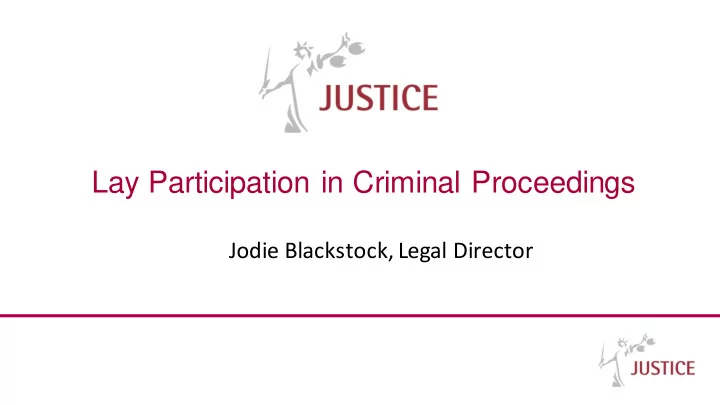

Lay Participation in Criminal Proceedings Jodie Blackstock, Legal Director
JUSTICE is Established in 1957 by a group of leading jurists, JUSTICE is an all-party law reform and human rights organisation working to strengthen the justice system – administrative, civil and criminal – in the United Kingdom. We are a membership organisation, composed largely of legal professionals, ranging from law students to the senior judiciary. Our vision is of fair, accessible and efficient legal processes, in which the individual’s rights are protected, and which reflect the country’s international reputation for upholding and promoting the rule of law.
Understanding Courts The legal system must place the lay user at its heart, and the process must be shaped around their needs. https://justice.org.uk/our-work/what-is-a-trial/
Focus • Understanding the process • Communicating with lay users • Consistency of support and reasonable adjustments for lay users
Understanding the Process [O]ur present court processes, our rules, our forms, our guidance, is woefully inadequate to enable LiPs, even educated, highly-articulate, intelligent LiPs, to understand the system. And that is a shocking reproach — to us, not them. Sir James Munby, former President of the Family Division. New and existing materials need to be more accessible to litigants in person; we need to produce information in a range of media and levels of complexity. We also need to do a better job of making sure that LiP information or links to LiP information is in the places where people expect to find it. Law for Life
Communicating with lay users The biggest problem with the more senior judges is that they think that they know how to talk to people. The biggest problem is actually understanding our own limitations. I think we all think of ourselves as very good communicators but I don’t think any of us would recognise that 50% of witnesses don’t actually understand the question they are being asked. Crown Court judge and trainer.
Consistency of support and reasonable adjustments for lay users The intermediary was brilliant – a diamond. I would recommend this to anyone. Without her, he wouldn’t have coped. He cracked up when he got to court – I was surprised he didn’t cry during his evidence. He said there were some questions that he couldn’t understand but he turned to her and she helped. Mother of an 11-year-old boy with cerebral palsy. It is frightening to go into Court, but knowing I had support from the Personal Support Unit made it easier. PSU client at the Central Family Court in London
41 Recommendations Practical information on what to expect at a hearing or a trial that is clear, accessible • and easy-to-understand and in a variety of formats. Effective participation of lay users must be facilitated as much as possible by the • presiding judge. • Judiciary-led consultation within the legal profession to evaluate modes of address and commonly misunderstood terminology deployed in court. • Training for new and continuing practitioners, in order to encourage lawyers and judges to communicate effectively with court users Questioning techniques should be adapted to the needs and understanding of each • lay user. Reasonable adjustments and support services currently made available to court • users and recommends expansion of good practice across all jurisdictions.
Reform? HMCTS has drafted easy to follow guidance; posters developed and going up in • Crown and magistrates’ Courts; Updated Crown Court Compendium section on lay users – aiming for a separate • leaflet • Easy Read forms in the criminal jurisdiction Criminal Procedure Rules – explanations to each rule • • Increasing number of HMCTS webpages with clear information on court • Sought a judiciary-led review of language, modes of address, orders and training Inns of Court College of Advocacy Bar Professional Training Course has been devised • to embed awareness of vulnerability and adaption to lay court users The BSB is working on an Ethics syllabus to test pupils post vocational training. • Liaising with SRA about guidance to solicitors on vulnerability •
Reform? Civil Justice Council consultation on vulnerability. Recommendations reflect our • report and for increased financial support to Litigants in Person (including to Support Through Court and other key charities); as well as Rule changes to further ensure that all civil judges, parties and advocates consider vulnerability of people involved in civil proceedings. Support Through Court has launched a national telephone helpline to provide • practical, procedural and emotional support and guidance before, during, and after court. Support received made users feel more confident, made procedures clearer and helped them feel better prepared Covid-19 and virtual proceedings – need for users to understand • • HMCTS vulnerability action plan
…the conscience of the legal profession
Recommend
More recommend